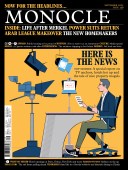
Issue 146
Monocle’s September issue includes a media special, which charts the newsrooms and anchors building trust, bolstering their brands and setting the agenda. Our other headlines include a look at the developers rethinking the property game in Hong Kong, Helsinki and Mexico City. We also visit the Arab League’s redesigned digs in Cairo, learn how architect David Chipperfield is leading sustainable development in Galicia by starting a bar, and meet the next generation of tailors altering the world of menswear. Plus: what you missed from the world of travel, including island escapes, itineraries, new hotels, and the latest takeoff and what’s coming down the track in aviation and train travel. All aboard?
In This Issue
Oops! No content was found.
Looks like we no longer have content for the page you're on. Perhaps try a search?
Return Home

